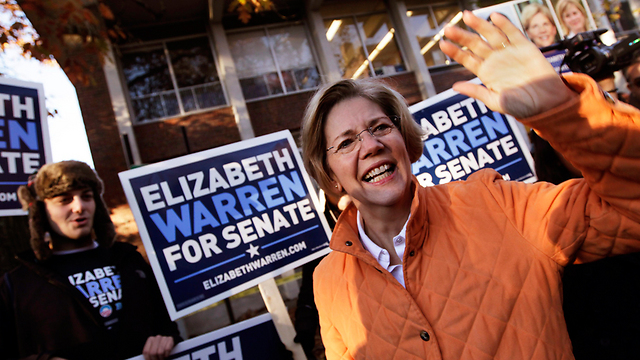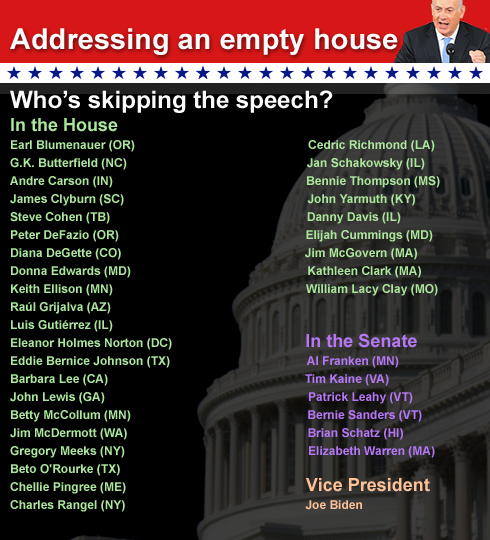
Prime Minister Benjamin Netanyahu will escalate his campaign against US President Barack Obama's Iran diplomacy on Tuesday in a speech to a joint session of Congress that has put unprecedented stress on the two leaders' already strained ties.
Departing Sunday for the United States, Netanyahu called his visit an "historic mission".
"I feel that I am the emissary of all Israelis, even those who disagree with me, of the entire Jewish People," he said. "I am deeply and genuinely concerned for the security of all Israelis, for the fate of the nation, and for the fate of our people and I will do my utmost to ensure our future."
Senators Elizabeth Warren of Massachusetts and Al Franken of Minnesota have announced that they will not attend the address, joining dozens of other Democrats, among them senior Jewish lawmakers, who will be absent when Netanyahu takes the podium.
The announcement of the speech caused outrage, as the invitation to Netanyahu from Republican Speaker of the House John Boehner had not been cleared by the White House, and in fact had apparently dfeliberately been kept from the Obama administration.
“It's unfortunate that Speaker Boehner’s actions on the eve of a national election in Israel have made Tuesday’s event more political and less helpful for addressing the critical issue of nuclear nonproliferation and the safety of our most important ally in the Middle East," said Franken on Tuesday, according to the Huffington Post.
"This has unfortunately become a partisan spectacle, both because of the impending Israeli election and because it was done without consulting the administration,” Franken continued. "I’d be uncomfortable being part of an event that I don’t believe should be happening. I’m confident that, once this episode is over, we can reaffirm our strong tradition of bipartisan support for Israel."
"I strongly support Israel, and I remain deeply concerned about the prospect of an Iranian nuclear weapon, which I discussed in detail with Prime Minister Netanyahu when we met in Jerusalem last November," Warren said in a statement, according to the Boston Globe.
Dozens of Democrats have announced their intention to skip the speech, according to various sources.
Although cold-shouldered by the administration in the wake of the row over the speech, Netanyahu has offered an olive branch, saying he meant no disrespect to Obama by accepting an invitation to address US lawmakers that was orchestrated by the president's rival Republicans.
The prime minister devoted a large portion of his Monday speech to AIPAC to insisting that he had not intended to cause a rift with the administration over the speech, repeatedly stressing that all close friends - and even family - have disagreements that do not mean the end of the relationship. .
As many as one-fifth of Democratic members plan to sit out the speech to protest what they see as a politicization of Israeli security, an issue on which Congress usually unites.
The White House is wary of Netanyahu using the forum to lay bare the closed-door negotiations designed to curb Iran's nuclear drive.
Obama also appeared Monday to wave off any prospect the bedrock US alliance with Israel might be ruined by the rancor.
"I don't think it's permanently destructive," Obama told Reuters in an interview. "I think that it is a distraction from what should be our focus. And our focus should be, 'How do we stop Iran from getting a nuclear weapon?'"
Netanyahu, who has played up his security credentials ahead of a closely contested March 17 election in Israel, has denied his speech would have any design other than national survival.
"I plan to speak about an Iranian regime that is threatening to destroy Israel," he told the pro-Israel US lobby AIPAC on Monday. "The last thing that I would want is for Israel to become a partisan issue, and I regret that some people have misperceived my visit here this week as doing that."
He did not elaborate on the speech's content. One aide said Netanyahu would inform US lawmakers of details on the nuclear talks in hope they would question the administration and thus defer a March-end target date for a framework deal with Iran.
Israel believed members of Congress "do not necessarily know the details of the deal coming together, which we do not see as a good deal," the aide told reporters on condition of anonymity.
Netanyahu wants the Iranians stripped of nuclear projects that might be used to get a bomb - something Tehran insists it does not want. Washington deems the Israeli demand unrealistic.
Under a 2013 interim deal, the United States and five other powers agreed in principle to let Iran maintain limited uranium enrichment technologies. US national security adviser Susan Rice argued on Monday that this commitment could not be undone.
"As desirable as that would be it is neither realistic nor achievable," she told AIPAC, over cheers by some audience members supporting Netanyahu's hard-line tack on the Iran talks.
"If that is out goal, our partners will abandon us and undermine the very sanctions we have imposed so effectively together," Rice added, urging US lawmakers not to intervene.
Congress, she said, "shouldn't play the spoiler now."
A deal with Iran is far from guaranteed, given US assessments that more than a decade of carrot-and-stick diplomacy with Iran might again fail to clinch a final accord.
"I would say that it's probably still more likely than not that Iran doesn't get to yes," Obama told Reuters. "It is more likely that we could get a deal now than perhaps three or five months ago. But there are still some big gaps that have to be filled."
Reuters and Yitzhak Benhorin contributed to this report

















